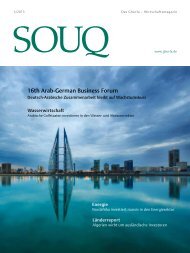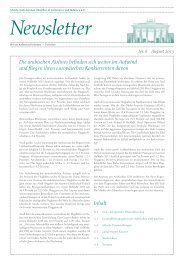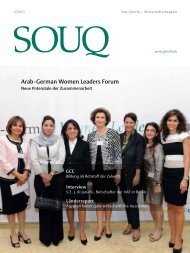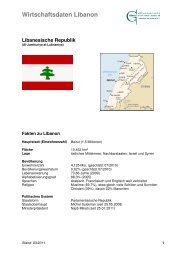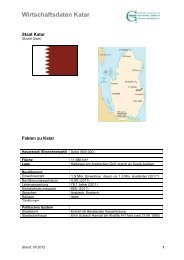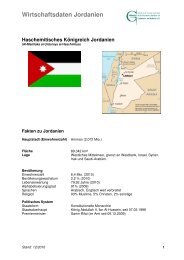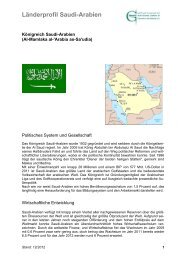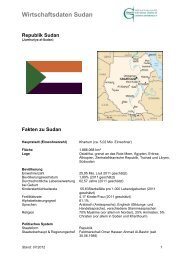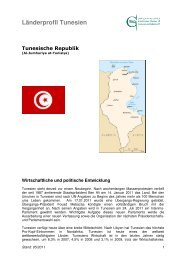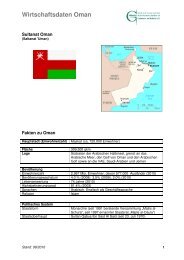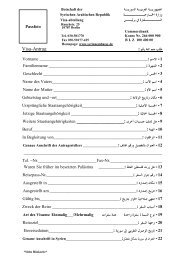Saudi-Arabien Wirtschaftshandbuch Saudi Arabia Business ... - Ghorfa
Saudi-Arabien Wirtschaftshandbuch Saudi Arabia Business ... - Ghorfa
Saudi-Arabien Wirtschaftshandbuch Saudi Arabia Business ... - Ghorfa
Sie wollen auch ein ePaper? Erhöhen Sie die Reichweite Ihrer Titel.
YUMPU macht aus Druck-PDFs automatisch weboptimierte ePaper, die Google liebt.
penalty even though the Sharia civil proceedings law allows<br />
this in Art. 55. For this reason long process extensions can<br />
occur in some cases as the accused party has an interest in delaying<br />
the proceedings and making the most of this leeway.<br />
Appeals<br />
Legal appeals against initial judgements passed by the<br />
Sharia courts and the Chambers for Trade Dealings of<br />
the Board of Grievances can be lodged within 30 days after<br />
the initial judgment has been announced.<br />
Process costs<br />
There are no court charges in <strong>Saudi</strong> <strong>Arabia</strong>. However the<br />
costs involved in the assertion of rights will not be reimbursed;<br />
these include the costs of the lawyer, translation<br />
costs and any costs for experts/surveyors. These costs can<br />
be considerable. Therefore it is always advisable to first<br />
analyse the costs before going to court.<br />
Arbitration clauses<br />
<strong>Saudi</strong> <strong>Arabia</strong> has its own arbitration procedure law (Royal<br />
Decree No.M/46 dated 12.07.1403 H (25.04.1983)).<br />
This applies between persons acting under private law. This<br />
means that the contractors of the public authority cannot<br />
simply include an arbitration agreement in the case of disputes<br />
in the contracts concluded with private suppliers or<br />
service providers (Art. 3 of the arbitration procedure law).<br />
The special feature of the <strong>Saudi</strong> arbitration law is that the<br />
arbitration procedure must be performed under the supervision<br />
of the otherwise responsible <strong>Saudi</strong> courts, in the case<br />
of commercial issues, under the supervision of the Board of<br />
Grievances. The arbitration application, the terms of reference<br />
and finally the arbitration award need to be submitted<br />
here for review. This ensures that the arbitration award is<br />
recognised by the <strong>Saudi</strong> courts and that it can be enforced.<br />
The other special feature is that the proceedings need to be<br />
conducted in Arabic at least as far as the contact with the<br />
<strong>Saudi</strong> courts is concerned. Also, the arbitrators need to be<br />
able to speak Arabic and should be of the Islamic faith.<br />
Arbitration clauses of foreign arbitration procedures are<br />
now more widespread although the issue of recognition<br />
and enforcement within <strong>Saudi</strong> <strong>Arabia</strong> needs to be taken<br />
into consideration.<br />
enforcement of foreign decisions<br />
The Board of Grievances (as stated in Art. 8 No. 1 g of<br />
the Law of Procedure) is responsible for recognising and<br />
rechTliche rAhMenBeDinGunGen – – underlyInG leGAl condItIonS<br />
enforcing foreign judgements and arbitration awards. It<br />
reviews foreign decisions from two different aspects: Firstly<br />
it reviews whether or not the judgement breaches mandatory<br />
<strong>Saudi</strong> law. For example, a judgment that awards<br />
interest would be unlawful. Secondly, it checks that reciprocity<br />
is guaranteed. This is not the case e.g. from a German<br />
point of view as the recognition of a German judgment<br />
appears generally improbable.<br />
On the Arab level, <strong>Saudi</strong> <strong>Arabia</strong> is party to three conventions,<br />
namely the Convention of the League of Arab<br />
States relating to the recognition of foreign judgements<br />
dating back to 1952, the Convention of the Arab<br />
League relating to the justice cooperation (Riyadh Convention)<br />
from 1983 and the Convention relating to the<br />
recognition of judgements of the members states of the<br />
Gulf Cooperation Council from 1995. Based on these<br />
conventions, a few decisions by other Arab states have<br />
also been recognised in <strong>Saudi</strong> <strong>Arabia</strong>.<br />
In 1994, <strong>Saudi</strong> <strong>Arabia</strong> signed the New York Agreement<br />
on the recognition and enforcement of foreign arbitration<br />
awards from 1958. For this reason, it is safe to assume that<br />
foreign arbitration awards will be recognised, although<br />
there is no recorded case where this has happened; having<br />
said this, there is also no known case where this has been<br />
attempted and failed either. In all cases, applications of<br />
this kind will be reviewed for compliance with the mandatory<br />
<strong>Saudi</strong> law; the rules of the <strong>Saudi</strong> ordre public always<br />
need to be observed.<br />
When designing contracts it is fairly easy to see the problem<br />
of deciding whether or not to apply foreign or <strong>Saudi</strong><br />
arbitration laws. In each case, thought must be given to<br />
the advantages that the agreement of an arbitration process<br />
would have on the process and with regard to the enforceability<br />
in the different jurisdictions.<br />
143



